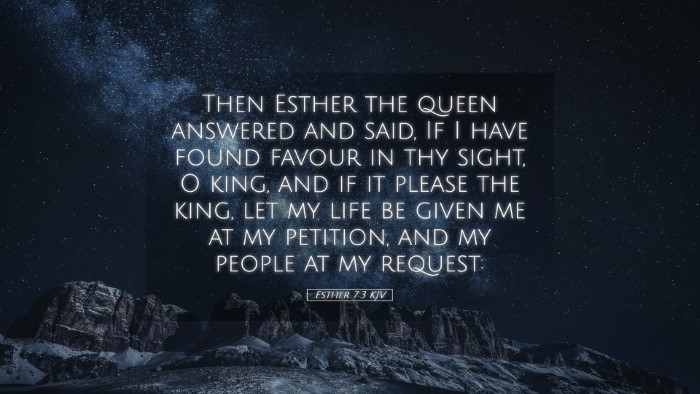Old Testament
Genesis Exodus Leviticus Numbers Deuteronomy Joshua Judges Ruth 1 Samuel 2 Samuel 1 Kings 2 Kings 1 Chronicles 2 Chronicles Ezra Nehemiah Esther Job Psalms Proverbs Ecclesiastes Song of Solomon Isaiah Jeremiah Lamentations Ezekiel Daniel Hosea Joel Amos Obadiah Jonah Micah Nahum Habakkuk Zephaniah Haggai Zechariah MalachiEsther 7:3
Esther 7:3 KJV
Then Esther the queen answered and said, If I have found favour in thy sight, O king, and if it please the king, let my life be given me at my petition, and my people at my request:
Esther 7:3 Bible Commentary
Bible Commentary on Esther 7:3
Verse Context: Esther 7:3 states, "Then Esther the queen answered and said, If I have found favor in thy sight, O king, and if it please the king, let my life be given me at my petition, and my people at my request:" This verse occurs during a pivotal moment in the narrative where Esther courageously reveals her identity as a Jew and pleads for her people's survival.
Significance of Esther's Appeal
Esther’s plea in this verse is deeply significant historically and theologically. In the texts of public domain commentaries, several key themes emerge:
-
Courage and Boldness:
Matthew Henry highlights Esther's courage in approaching the king. This was a dangerous act, as entering the king's presence uninvited could lead to death. Esther's bravery in making her request is a testament to her faith and determination to protect her people.
-
Divine Providence:
Albert Barnes notes that Esther’s situation was orchestrated by God’s providence. It was not mere chance that placed her in the royal position; it was part of a divine plan to save the Jewish people from annihilation.
-
Vicarious Intercession:
Adam Clarke elaborates on the nature of Esther’s intercession for her people. She steps into the role of a mediator, revealing a Christ-like quality in her advocacy. This foreshadows the ultimate intercession of Christ on behalf of humanity.
Theological Implications
The theological implications of Esther 7:3 are vast, including themes of identity, faith, and the concept of sacrifice:
-
Identity:
Esther's acknowledgment of her identity as a Jew reflects the broader theme of the Jewish people maintaining their identity amidst persecution. Matthew Henry discusses how this moment was crucial for the Jewish nation and their resolve to remain faithful to God despite the existential threat they faced.
-
Faith in Adversity:
Esther's plea is not just for survival but also a display of her faith amidst perilous circumstances. This is a reminder for believers to have confidence in God's provision and timing, as highlighted by Albert Barnes.
-
Sacrificial Love:
Esther is willing to risk her own life for her people, which emphasizes the sacrificial nature of true love. Adam Clarke draws parallels to the ultimate act of sacrifice in the New Testament, where Jesus laid down His life for humanity.
Literary Aspects
The literary structure of Esther 7:3 is significant in understanding the dramatic tension of the narrative:
-
Foreshadowing:
Henry points out that Esther’s request serves as foreshadowing for the eventual downfall of Haman. Her clear presentation of the stakes lends gravity to her situation.
-
Dramatic Irony:
Barnes notes that the king is not aware of Haman’s evil plot at this point, creating a gap between the audience's knowledge and the characters' understanding, a classic example of dramatic irony in literature.
Practical Applications for Today’s Believers
Esther 7:3 offers multiple practical lessons relevant for today's believers:
-
Stepping Out in Faith:
Just as Esther exhibited remarkable faith to approach the king, believers are encouraged to step out in faith in their challenges, trusting in God’s support.
-
Advocacy for Others:
The call to advocate for others, especially the marginalized, is central to Christ's teaching. Esther’s plea serves as a model for intercession and social justice today.
-
Courage in Identity:
Owning one's identity as a believer in a secular world can be daunting. Esther embodies the strength to stand firm in one’s beliefs, offering a model for Christians today.
Conclusion
In summary, Esther 7:3 serves as a powerful reminder of courage, the importance of identity, and the necessity of intercessory action. The insights offered by Matthew Henry, Albert Barnes, and Adam Clarke provide a rich tapestry of understanding that emphasizes the relevance of this verse in the lives of pastors, theologians, and laypeople alike. Esther’s example inspires believers to face their challenges boldly, advocate for the voiceless, and trust in God’s providential plan for their lives.


